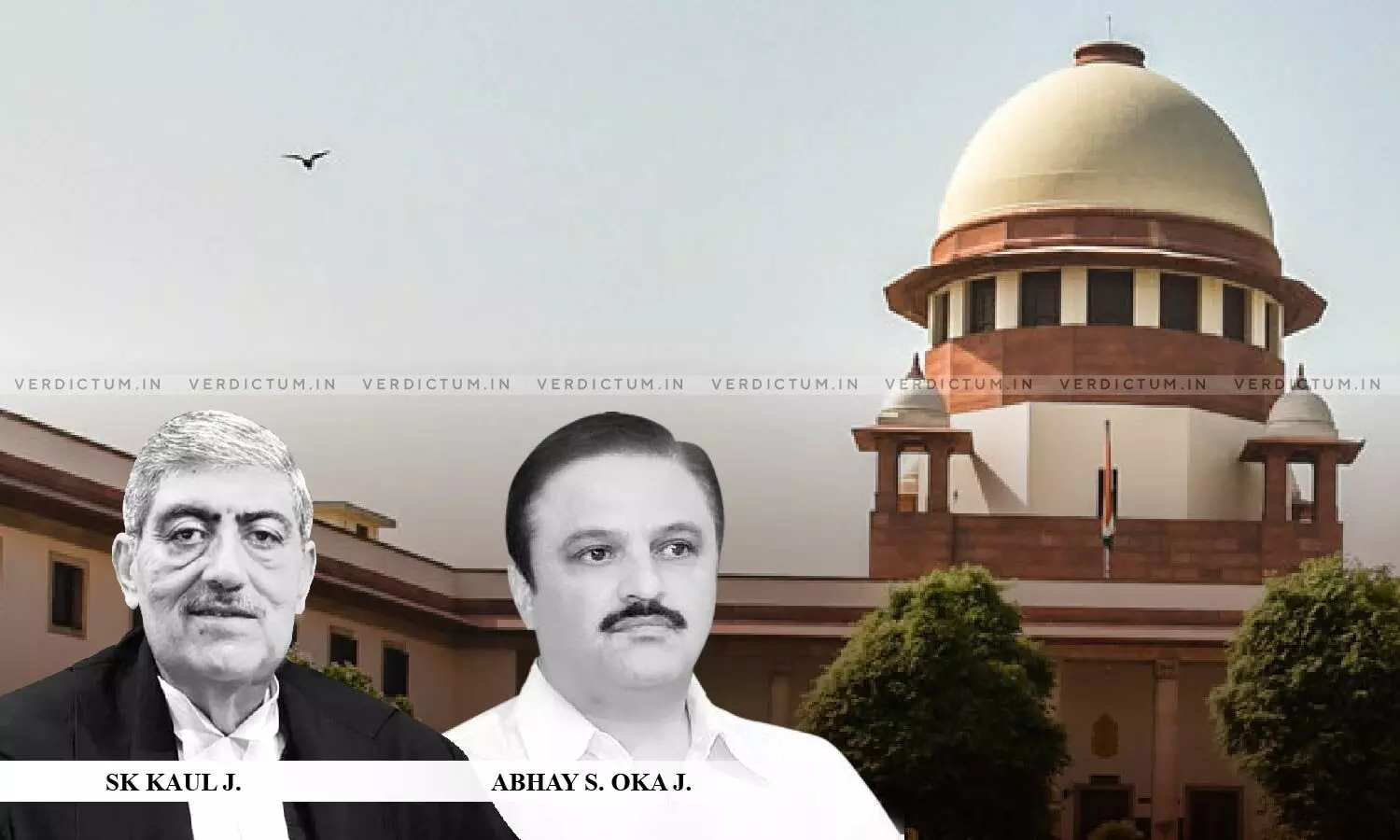
Transfer Of Property To Children Can Be Cancelled Only If Established That It Was Subject To Condition Of Maintaining Parents- SC
 |
|The Supreme Court has observed that effectuating the transfer of property to children subject to a condition of maintaining senior citizen/parent is not necessary under Section 23 (1) of the Maintenance and Welfare of Parents and Senior Citizens Act, 2007 and that existence of such conditions must be established before the Tribunal.
The Bench of Justice SK Kaul and Justice Abhay S. Oka observed –
"Effecting transfer subject to a condition of providing the basic amenities and basic physical needs to the transferor – senior citizen is sine qua non for applicability of sub-section (1) of Section 23."
In this case, Respondent No. 1 acquired land and she claimed that the land was acquired by way of inheritance from her father. Thereafter, Respondent No. 1 executed a release deed in respect of a part of the subject property in favor of her daughters. As per the said release deed, the daughters became the owners of one-third share each in the property subject matter of the release deed.
This was followed by the execution of another release deed in favor of her son. Another release deed was executed by Respondent No. 1 in favor of her son on the same day. All the release deeds were registered.
Thereafter, the last and the third deed were challenged by Respondent No. 1 and other parties before the Civil Court.
The Civil Court declared the release deed null and void.
As per Respondent No. 1, her son and grandson preferred appeals against the aforesaid decree, and during the pendency of the appeals, they sold the property subject matter of the release deed to a third party.
Respondent No. 1 then filed a petition under Section 23 of the 2007 Act before the Maintenance Tribunal. In the petition, Respondent no.1 stated that her relationship with her son and daughters was strained and therefore, her son and daughters were not maintaining her. The contention of Respondent no.1 was that the release deed executed by her in favor of her two was illegal and void. Accordingly, a prayer was made to cancel the release deed under Section 23 of the 2007 Act.
The petition under Section 23 filed by Respondent no.1 was contested by the Appellant. The Maintenance Tribunal declared the release deed null and void and held that Respondent No. 1's children were not willing to take her care.
On an appeal by the Appellant, the High Court confirmed the order of the Maintenance Tribunal.
Aggrieved, the appellant approached the Apex Court.
Advocate Kanhaiya Singhal appeared for the Appellant while Advocate Sunil Fernandes appeared for the Respondent before the Court.
The Court noted that the 2007 Act has been enacted for the purposes of making effective provisions for the maintenance and welfare of parents and senior citizens guaranteed and recognized under the Constitution of India.
Further, the Court observed that for attracting Section 23(1) of the 2007 Act, two conditions must be fulfilled: i) The transfer must have been made subject to the condition that the transferee shall provide the basic amenities and basic physical needs to the transferor, and ii) The transferee refuses or fails to provide such amenities and physical needs to the transferor and thus held –
"If both the aforesaid conditions are satisfied, by a legal fiction, the transfer shall be deemed to have been made by fraud or coercion or undue influence. Such a transfer then becomes voidable at the instance of the transferor and the Maintenance Tribunal gets jurisdiction to declare the transfer as void."
The Bench further observed, "When a senior citizen parts with his or her property by executing a gift or a release or otherwise in favour of his or her near and dear ones, a condition of looking after the senior citizen is not necessarily attached to it. On the contrary, very often, such transfers are made out of love and affection without any expectation in return. Therefore, when it is alleged that the conditions mentioned in sub-section (1) of Section 23 are attached to a transfer, existence of such conditions must be established before the Tribunal."
The Court noted that the petition filed under Section 23(1) filed by the Respondent No. 1 shows that it was not even pleaded that the release deed was executed subject to a condition that the transferees (the daughters of respondent no.1) would provide the basic amenities and basic physical needs to Respondent no.1.
Thus, the Bench added –
"As can be seen from the impugned judgment of the Tribunal, immediately after a reply was filed by the appellant that the petition was fixed for arguments. Effecting transfer subject to a condition of providing the basic amenities and basic physical needs to the transferor – senior citizen is sine qua non for applicability of sub-section (1) of Section 23. In the present case, as stated earlier, it is not even pleaded by respondent no.1 that the release deed was executed subject to such a condition."
The Court thus held that the impugned order of the Tribunal cannot be sustained as the twin conditions of Section 23(1) were not satisfied.
Accordingly, the Court allowed the appeal and set aside the impugned order of the High Court.
Cause Title - Sudesh Chhikara v. Ramti Devi & Anr.
Click here to read/download the Judgment